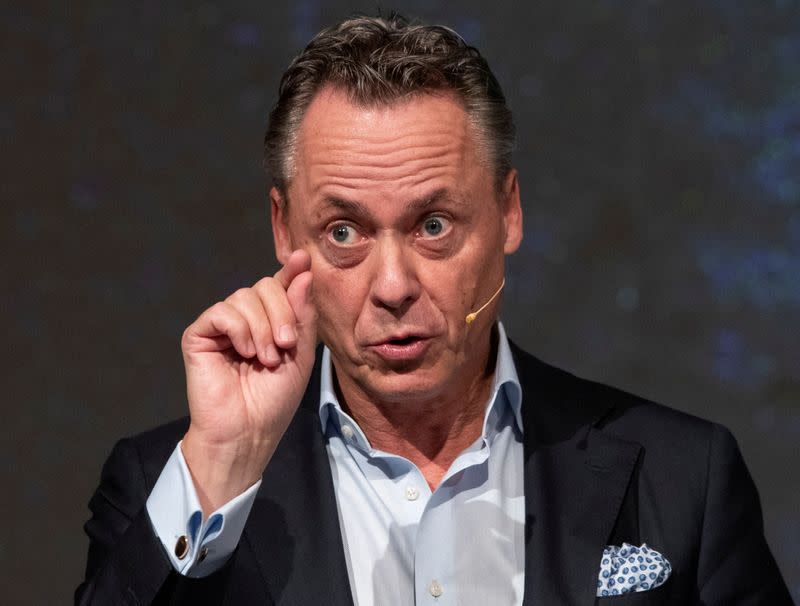Ralph Hamers, the Dutchman thrust in the driver's seat at Swiss bank UBS
By Noele Illien, Toby Sterling and Tom Sims
ZURICH (Reuters) - When Ralph Hamers emerged from days of emergency talks that ended with his Swiss banking giant rescuing its arch-rival Credit Suisse on Sunday, the bleary-eyed UBS CEO called it a "sad day" that no one had wanted.
The Dutchman finds himself cast as the potential saviour of Swiss finance - managing a bank with a balance sheet twice Switzerland's economy and in a country whose reputation as a financial powerhouse has taken a major hit just as investor confidence in global banks is its weakest in years.
"No one wished to be here to do that," he told Switzerland's national broadcaster SRF after UBS agreed to buy Credit Suisse in a deal engineered by Swiss authorities.
Hamers, with no big-ticket M&A experience under his belt, has cut his teeth reshaping a major Dutch lender mostly by selling businesses. Now he will need to combine two banks with $1.6 trillion in assets, more than 120,000 staff and a vastly complex balance sheet.
A nearly 30-year veteran of Dutch lender ING - he married a former colleague from the bank - Hamers was a surprise choice when he was appointed in early 2020 to lead UBS. He had little experience in investment banking or wealth management.
At ING, Hamers was seen as a tech-savvy boss who spurned the image of a stuffy banker for a young, modern and approachable CEO, and there he was credited with overseeing a digital transformation - including a successful build-up in Germany - while being one of the lowest-paid bosses of a major European bank.
The digital success at ING is what attracted UBS's then-chairman Axel Weber to poach him, declaring Hamers was "the right CEO to lead our business into its next chapter", at a time that some analysts said UBS's progress was stagnating.
His immediate challenges following Sunday's deal will be to lay off thousands of staff, potentially more than 10,000, sources have told Reuters, run down Credit Suisse's investment bank and reassure the world's wealthy that his bank remains the best place to park their cash.
His record at ING is not all shiny. In 2020, months after his move to Zurich, a Dutch appeals court ordered a criminal investigation into the role Hamers played in ING Group's failure to crack down on money laundering. Prosecutors had previously said they would not seek charges.
UBS declined to comment on the matter on Monday but the bank said at the time that it had "full confidence" in Hamers.
While at ING, though he never faced an integration task of this magnitude, he undertook several restructurings in the Netherlands and Belgium, experience on which he will be able to draw, according to a former colleague.
Former Unilever CEO and fellow Dutchman Paul Polman gave a Hamers a vote of confidence on Monday, telling Reuters that "Hamers is a purposeful leader certainly well prepared to lead Swiss banking through these challenging times."
What's more, he will also be able to lean on UBS Chair Colm Kelleher, a veteran of Morgan Stanley, whose experience in overseeing securities trading will come in useful as UBS prepared to sift through Credit Suisse's risky positions.
UBS declined to comment for this article. Kelleher said last year that he and Hamers "get on phenomenally well".
While UBS has taken out its decades-old rival at a fraction of Credit Suisse's recent share price and Switzerland is pledging roughly 260 billion Swiss francs ($280.20 billion) in loans and guarantees to underpin the new group, Hamers will need to keep shareholders on side. He'll be pressed to show that the deal is in their interests, at a time when UBS was doing relatively well on its own.
Under Hamers, UBS in 2022 earned $7.6 billion in profit and counts many of the world's wealthy as clients -- a sign of how far it has come after its government bailout during the global financial crisis more than a decade ago, clampdowns on banking secrecy and multiple restructurings.
Asked in Sunday's Swiss television interview how much he had slept in the last three days, Hamers, a passionate race cyclist, said, "not so much."
"Maybe you can see that. But that's how it should be. We are talking about serious things here. They should be done seriously."
($1 = 0.9265 Swiss francs)
(Additional reporting by John Revill, Oliver Hirt and John O'Donnell; Editing by Tommy Reggiori Wilkes and Nick Zieminski)

 Yahoo Finance
Yahoo Finance 

